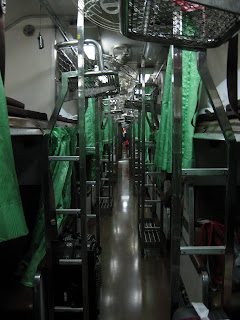 |
| Singapore's finest. |
Luang Prabang Laos: I took a
night train to Laos! I took an overnight bus in Laos! I ate sticky rice and
curry in Laos! This tiny landlocked country stole my heart with its mountains,
its food and its darling obsession for outlawing motos. But walking around the
former mountainous country’s former capital city of Luang Prabang, by the
beautiful old temples and the Mekong was a memory to cherish.
 |
| A little of Mondlekiri... |
Mondlekiri: Perhaps my favorite
day in Cambodia thus far happened in Mondlekiri. Renting a moto and driving
through the mountains; pine trees, Thai food and one unique eco lodge,
waterfalls, calm and quiet, and sunshine mixed with rain. Mondlekiri was one
favorite piece of a fabulous month-long visit from my very favorite person.
The EED Grant: I’ve never
written a grant or proposal in my entire life (my college failed me in that
respect). So imagine my surprise when the first grant I had ever written for
$40,000 USD for my one partner was accepted by German funder EED? I
earned my wings as a partner adviser.
The Day they “Got It”: I can
clearly remember the day when at my partner, we brought in an outside
consultant to discuss our M&E framework (what I had been putting together
for the past several months with two national staff). He loved it, and a light bulb
went on for the national staff. I knew in that moment that they got it. It
was validating of our work together, and appeased doubts that they would never
understand the purpose of documenting one’s work. Moments like these reward us service workers who often question if we're doing anything right.
 |
| The Temples of Angkor (credit to Jon) |
Singapore Orchid Garden:
Singapore’s Orchid Garden was perfect. Cambodia doesn’t afford many green
spaces, so sitting down next to a bed of orchids was almost too much for me to
handle. It was almost a restoring of a soul; that natural untainted beauty does
exist, even in small little places, and in small flowers. It was also one of
the cheaper things to do in the over-developed Singapore.
Angkor Wat: I’ve been to Angkor
Wat twice now. I don’t love Angkor Wat because it’s so freaking hot out there
and you can’t see the temples without becoming completely exhausted! However, it’s
a pretty spectacular sight to see. Everyone should see it once in their life (I
think Jackie Kennedy said that).
 |
| Laos Beckons |
Learning to Drive: I’ve written
so much about driving moto in Phnom Penh and the countryside. It’s because I
just love it that much! The day when I leave my beloved moto (affectionately
known as “lake boo-in” or “Number Four”), I might actually cry.
The Team: The vast majority of
the MCC Cambodia team arrived within Cambodia in a 10 month time-frame. As a
result, our three-year terms will all overlap a good two years. This solid
group of couples, mostly non-Mennonites who have all extended their homes, their
fridges, their humor and stories, their vacations, their friendships, and (in
one case) their firstborn red-head child to me. I will prize these friendships for life. (This
also includes the one-year “interns” or “saltines” who I have been happy to count among my friends.)
 |
| A little Timor with the little siblings |
I am so excited for 2012; challenge filled certainly but one hopefully filled with joy. I look forward to:
·
New friendships and deepening present friendships
·
Visiting new places and countries
·
Seeing my family and dear ones again
·
More late night skype conversations
· Completing GREs
·
Possibly a half-marathon...
·
Above all else, finally getting my partner on board with the M&E
indicators I wrote last September. (No one ever said capacity building or even communication
was easy.)















